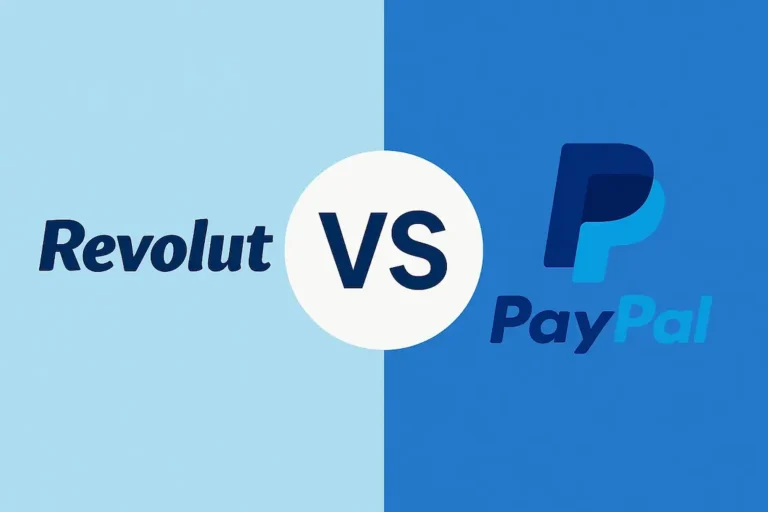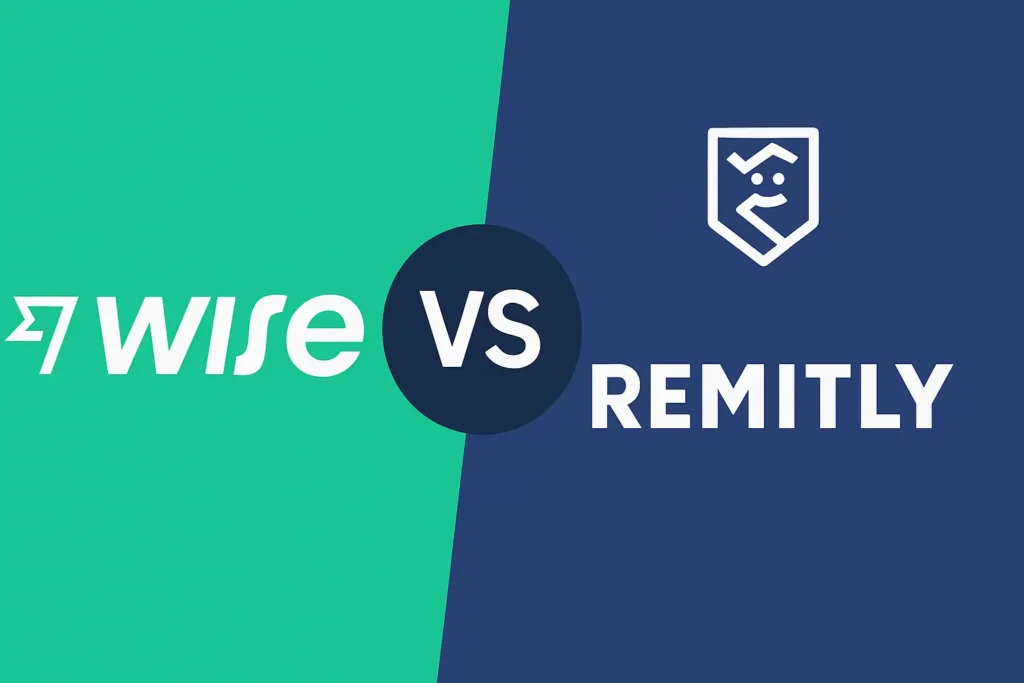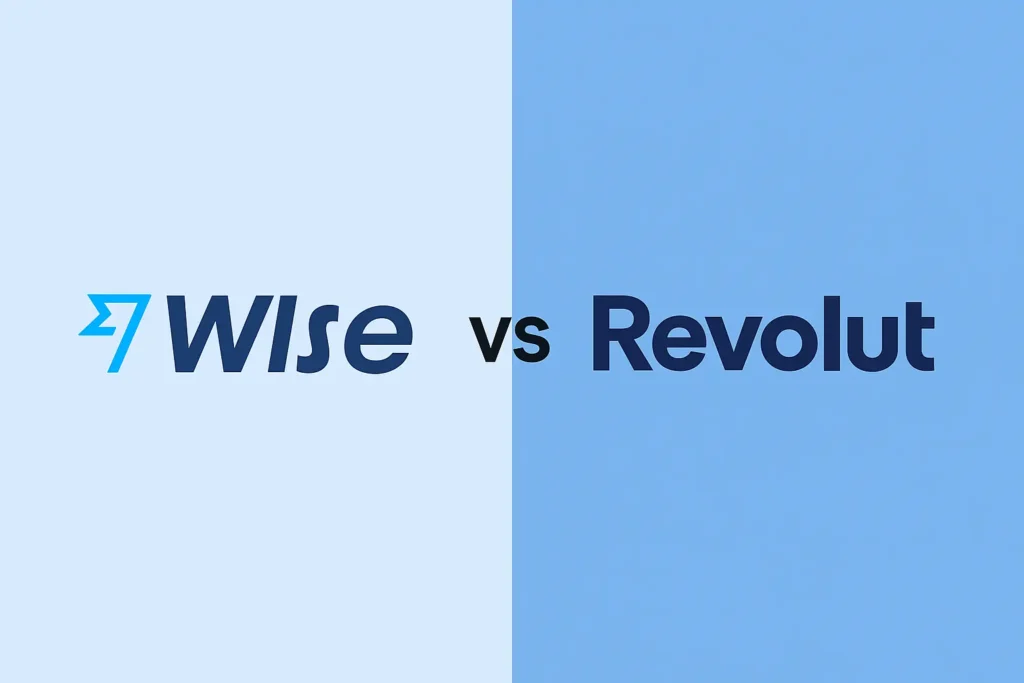The world of digital payments has changed dramatically. It was once dominated by big names like PayPal. Now it’s also occupied by upstarts that call themselves ‘fintechs’—financial technology firms, such as Revolut, which claims 50 million customers across 38 countries. So which is better for the average millennial? We favor Revolut, and here’s why: We believe the average millennial can save hundreds, maybe even thousands, of dollars a year in unnecessary fees by using Revolut instead of PayPal.
Following the examination of numerous user critiques, cost arrangements, and discussions on real-life experiences from officials on both fronts — as well as the volumes and nuances of the fine print — we present here what you might call the ‘definitive ruling’ on these two very different court operations. And their differences are eye-popping.
- Digital Wallet Comparison: Understanding the Basics
- PayPal Fees vs Revolut Fees: The Real Cost Breakdown
- Best Way to Transfer Money Internationally: Revolut vs PayPal
- PayPal Business vs Revolut Business: Features for Entrepreneurs
- Best Payment App Features: Cards, Security, and User Experience
- Real User Reviews: What G2 and Reddit Say About Both Platforms
- Best Paying Apps: Final Verdict and Recommendations
- FAQ
Digital Wallet Comparison: Understanding the Basics
PayPal was established in 1998 as a mechanism for online payments and quickly became the method of choice for e-commerce. It works as a financial services company that contains everything a digital wallet should have and then some—peer-to-peer payments (think Venmo, only international) and in-maid service transfers, plus an international and app presence in 200+ markets.
Revolut calls itself a ‘super app’ because it combines, in a single app, banking, investment, and payment functions. It’s like a one-stop shop. While it is a licensed bank in the EU, it also provides international services and applications. So, it’s not just an app; it’s usable all over the world. Indeed, it can be denoted as an international super app. A super app can do everything. That’s why it’s super. So, if you’re going to an IPO (Initial Public Offering), then Revolut can invest in it from the app itself.
What is their most basic difference? PayPal is mainly a payment processor and offers its users a range of protections that help make up for its lack of banking capabilities. Revolut, on the other hand, has never been just an app; it functions as a full-fledged digital bank. It offers an app that facilitates payments but also many more features.
PayPal Fees vs Revolut Fees: The Real Cost Breakdown
Where the marketplace gets very interesting is that even though it appears both marketplaces are essentially after the same thing—being the go-to site for anyone wanting to sell something and for anyone wanting to buy something—they actually have very different strategies, and those strategies are part of the reason for their fee structure. The marketplaces are, in effect, subsidizing the buyers in some instances, and in some cases, both the buyer and the seller are paying for the use of the service.
PayPal’s Fee Structure (2025):
- Currency exchange: 3.5% for USD/CAD and approximately 4% for other currencies
- The commission for international transfers is around 5% and up. Reminder: International transfer rates tend to increase for amounts over $50,000—so, if you’re sending say, $75,000, you may as well figure on an international transfer rate of at least 10%. And then there’s the conversion rate. If your bank or credit card converts rates for you, it will usually figure in an additional 2-3%. So, if you’re sending $50,000 overseas, you’re paying at least $3,700 in fees alone.
- PayPal allows for free domestic transfers if you use your PayPal balance. If you don’t, then PayPal would like 2.9% + $0.30 for your transfer. International transfers: 0.5%–2% (up to $20,000), 3% (over $20,000). However, if you look at the next two tables, you’ll see that these numbers are not uniform around the world.
- Fees for cross-border transactions increase by 4.5% to facilitate conversions
Revolut’s Fee Structure (2025):
- Transforming cash in different currencies should cost around what it does right now—a trivial amount—capping at $5 per $1,000. We can charge 0.5%, but we’ll continue to cover it—or not even cover it—up until that point. By the end of the next quarter, you’ll be able to convert cash in different currencies for free, up to $1,000 each month.
- International money transfers: Transferring money to other Revolut accounts is free, no matter where the recipient is located. Sending money to accounts at other banks, overseas, will cost you as much as 5% of the transfer amount. “There’s no fee at all if you use our app, and that’s true in more than 130 currencies you can convert to,” Revolut’s Ros Castle (head of global communications) tells NerdWallet.
- No cost for withdrawing from an ATM for a monthly amount of $300; thereafter, a 2% fee applies
- PayPal Preferred account holders at top web destinations may access in the account section of the service a necessary currency conversion from one currency to another without any additional charge—making it free for these account holders who wish to access an identity-based alternative to regular currency and PayPal conversion services
The perceptive observation of a Reddit user within the r/Revolut community comes as close to the perfect articulation as you could hope for. That person sees something others cannot, or sees it before they can. In this case, the Redditor notices a particularly thorny contradiction and spells it out with equal parts simplicity, brilliance, and damning effect.
“Revolut’s basic free account gives you 1000£ / 1000€ equivalent per month in calendar month at-caida currency conversions at spot market rates… PayPal and your average traditional bank will ding you for upwards of 10% in hidden fees for the same services.” – u/n1c0linox
The decision: PayPal doesn’t fare well in our analysis of the fees they charge users, compared to the clear, effective budgetary control offered by Revolut.
Best Way to Transfer Money Internationally: Revolut vs PayPal
The largest gap between international platforms is revealed by international fund transfers.
Speed and Limits:
- PayPal: Instant transfers within the network, 1-3 business days externally, with a daily limit of $60,000
- Revolut: Real-time transactions between Revolut users, same-day transactions for external payments. There is a $250,000 daily limit
Exchange Rates:
PayPal has its in-house foreign exchange rates with embedded profit margins. Meanwhile, Revolut uses the same exchange rates one might find at your local bank. On weekends, however, it can’t resist using exchange rates that are 0.5 percent worse.
A person living in Europe discussed an AliExpress experience on Reddit. They noticed the estimated delivery time of their orders was listed in their order details. They could not say whether the estimation was reliable because they could not track their orders, but they did have some estimated dates to refer to.
“In a number of places, I have read that the fees for currency conversion with PayPal are somewhere around 3.5% of the total paid amount. Revolut should offer a much cheaper—if not totally free—route for doing the same international conversion… even with transactions as low as 100€, this could save some buck.” – r/Revolut
In reality: Sending $1,000 overseas will cost you around $35 to $40 if you use PayPal. Send the same amount using Revolut and you’ll pay $5 to $10.
PayPal Business vs Revolut Business: Features for Entrepreneurs
Each platform’s target audience is clearly revealed by its business features.
PayPal Business Advantages:
- Active accounts: 377 million
- Thorough buyer/seller safeguarding
- Creating invoices and processing payments
- 20+ million merchants can now connect with us in multiple ways, thanks to the dedicated range of plugins and SDKs we provide that cover all the bases
- Ensuring optimal cash flow is a top priority for any business, and PayPal offers several flexible ways to help keep your cash flow smooth and steady
Revolut Business Advantages:
- Business accounts with support for over 30 currencies
- Spending controls and analytics happen in real time. You and your company do not have to wait until the end of the month, or the end of the quarter, or the close of an accounting period, to understand what is being spent on or with whom
- Reduce the costs of moving money across international borders
- Getting fintech to play nice with each other, creating a collaboration and seamless experience across the financial industry
PayPal’s G2 rating holds 4.4 out of 5 from a substantial 2,182 reviews, while Revolut Business maintains 4.5 out of 5 from a meager 17 reviews. The sample size in this case is either a mountain to a molehill or a tsunami to a teacup.
PayPal’s integration with established e-commerce businesses makes it the winner there. For international startups and globally operating firms, Revolut and similar companies offer a set of banking features that provide better value for the services required by those firms.
Best Payment App Features: Cards, Security, and User Experience
Security Comparison:
Regulated states of the art financial institutions, the platforms pursue different strategies.
PayPal Security:
- Procurement Safeguard extending up to twenty thousand dollars
- Secure transactions employing 256-bit SSL encryption ensure that the data exchanged with the website is not intercepted or misused
- Detection of fraudulent activity, both before and after the fact, as well as ensuring that your sellers are who they claim to be
- Conflict resolution procedure
Revolut Security:
- License to operate as a bank. A bank must be licensed to operate. Holding a license means that you’re also subject to its conditions
- Consumption-based virtual card technology, where the cards exist in cyberspace only long enough to complete one transaction
- You can receive a text or email alert every time a charge comes through on your card. This can warn you of any unauthorized use right away
- The verification of an individual’s identity using one or more unique biological traits (e.g., fingerprints, eye characteristics, facial features, etc.)
A Reddit thread that caused quite a stir laid out in no uncertain terms the perspectives of those charged with securing our freedoms:
“Revolut lacks the Goods and Services method of payment. However, PayPal does, and PayPal charges a fee that acts as insurance against the nondelivery of goods or services.” – u/SirDinadin
Card Features:
- PayPal: Offers both debit and credit cards in the United States that provide 1-3% cashback. This card is accepted at over 29 million locations
- Revolut: Metal cards with travel perks, airport lounge access, and custom designs
Real User Reviews: What G2 and Reddit Say About Both Platforms
The fascinating story of two very different customer bases is told by the user experience.
PayPal User Sentiment:
G2’s rating is 4.4 out of 5 stars (from 2,182 reviews), but Reddit stories tell a different tale:
“Never, ever use PayPal. A warning: do not put your money in their savings. My account got locked for zero reason. They are holding my savings hostage.” – r/paypal
Some usual grievances about using PayPal center around the freezing of accounts, mainly at times when transactions hit a high note. Disputes are too lengthy and often frustrating for the user. Then there is the customer service part to deal with.
Revolut User Sentiment:
When it comes to Revolut banking service, G2 shows a star rating of 3.9 out of 5 based on 18 reviews. On the other hand, Reddit tells a more mixed tale:
Positive feedback:
“Revolut is way safer than pp” – Multiple Reddit users
Concerning experiences:
“My rent was thrown out the door because Revolut restricted my account for no apparent reason. The restriction was lifted after one day, so I could access my account again. But, guess what? The access didn’t last long. Now I’m locked out of my account again.” – u/T1ll_187er
Pattern identified: PayPal clients gripe about fees and account holds. Revolut clients revel in a near-zero-fee world but occasionally face account restriction issues.
Customer Support Reality:
- PayPal: In-the-flesh telephone support is there for you, but they can be hard to reach at times. For tougher nuts to crack, you could be looking at not just days, but weeks before you see a resolution
- Revolut: Chat-based support gives users mixed results; some get a response almost immediately, while others have to wait as much as 48 hours. Premium account holders receive nearly instant in-app response

Best Paying Apps: Final Verdict and Recommendations
After evaluating pricing models, user interfaces, and some actual uses, see which situations might favor one service over the other.
Choose Revolut if you:
- Perform international transactions regularly (save 60-80% on fees)
- Travel often and require functionality with multiple currencies
- Operate a global business with international suppliers
- Desire extensive banking capabilities that deliver much more than mere payment facilities
- Can tolerate rare account verification lags
Choose PayPal if you:
- Mainly purchase online and look to pay with a card form factor that offers solid buyer protection
- Operating an online retail business requires finding a payment processor
- They desire well-defined avenues for the resolution of conflicts between parties
- Do you need payment processing for your website?
- Opt for normal customer service methods
The Hybrid Approach:
A lot of informed users often use both systems at the same time. They do this because each system provides unique benefits: PayPal for online purchasing where insurance is needed, Revolut for international purchasing and daily digital spending.
Cost comparison example: For $500 monthly international transfers, PayPal costs ~$200/year in fees versus Revolut’s ~$30/year – a $170 annual savings.
At its core: Revolut is a cheaper, more internationally capable sibling of PayPal, whereas PayPal is a more secure platform thanks to its integration into the massive, international merchant ecosystem. The average user’s choice hinges on whether they value cost savings or the types of financial security features that PayPal offers.
The digital payments milieu is one of change at the moment. Both platforms continue altering or adding to their menus of services. PayPal now offers cryptocurrency transacting services, and Revolut has recently moved into offering both investment and insurance services to its users. Pay attention to how your chosen vendor of payment platform services is evolving its offerings.
FAQ
Q: Is Revolut a real bank?
A: It’s complicated, and honestly, this confuses a lot of people. In the UK and Europe, Revolut has proper banking licenses. In the US, they partner with traditional banks (currently Lead Bank) to make sure your money has the same FDIC protection you’d get anywhere else. Your money is safe, but the exact setup depends on where you live.
Q: Can I use Revolut as my main bank account?
A: Absolutely. Tons of people already do this—they get their paychecks deposited, set up their bills on autopay, and handle all their everyday banking through Revolut. That said, it’s probably smart to keep a traditional bank account open too, just in case you need something Revolut doesn’t offer in your area.
Q: Is Revolut safe to use?
A: Yes, and they take security seriously. Here’s what protects you:
Your money is FDIC-insured up to $250,000 (if you’re in the US)
They’re regulated by the FCA in the UK
Advanced fraud detection that catches suspicious stuff before it becomes a problem
You can instantly freeze your card if something seems off
Multi-factor authentication keeps your account locked down
Q: What happens to my money if Revolut goes under?
A: This is probably the biggest worry people have, and it’s totally understandable. In the US, your money sits in FDIC-insured partner banks, so you’re covered up to $250,000. UK users have similar protection through the Financial Services Compensation Scheme. EU users get protection under their local banking rules too.



